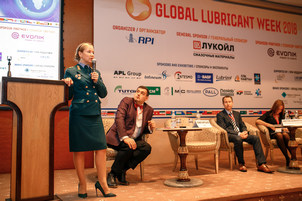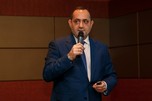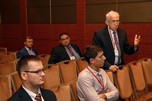Global Lubricants Week 2018: focus on waste oils management
October 18, 2018

Issues of environmentally safe management of used lubricants, as well as transformer oils contaminated with polychlorinated biphenyls (PCBs), were discussed during the Global Lubricants Week, held in Moscow from 9 to 12 October 2018.
Within the framework of the International Conference “International Lubricant Conference” were covered issues of used oils recycling as well as legal aspects of the waste oils management. Natalia Sokolova, Head of the State Supervision and Regulation Department for Waste Management and Biodiversity of Rosprirodnadzor, emphasized that the used lubricants are subjected to recycling, according to the Technical Regulations of the Custom Union. At the same time, Rosprirodnadzor forms a list of technologies that have proven their effectiveness in waste recycling processes. N. Sokolova separately noted that transformer oils contaminated with PCB are classified as waste of 1-st class of hazard and are subjected to special regulation. Attention of nature resource users should be focused on the correct disposal of PCB-containing oils in accordance with advanced environmental standards.
Despite the active assistance of all market players, as well as regulatory authorities, the market of recycling waste oils and lubricants is only at the beginning of its development. According to the President of the Waste Recycling Association, David Yesayan, the legal capacity for waste oils disposal in Russia is only 75,000 tons. At the same time, the estimated volume of used oils in the country amounts to 1.2 million tons per year. To eliminate such a huge gap and stimulate the waste oil processing industry, the informational responsibility of the manufacturer is introduced in terms of informing the consumer about the need to hand over waste from the use of goods to licensed organizations for recycling at the indicated collection points, the extended producer responsibility and recycling standards were introduced. Since 2019, it is planned that the rates of environmental fee per ton of unused products will increase by 10% for waste oils and petroleum products and by 271% for plastic packages contaminated with oil products of different origin.
UNIDO consultant on PCB management, Ekaterina Demicheva, noted that despite the intensive development of the waste oil processing industry, including transformer oils, there is no separate collection and processing of PCB-contaminated oils in Russia. As a result of potential cross-contamination, the amount of PCB-contaminated waste multiplies, and recycling of waste of uncertain composition represents both an environmental hazard and health hazard to personnel. The activities on creation the system for treatment of PCB-containing materials in terms of inventory, separate collection, cleaning from PCBs and recycling is carried out by UNIDO together with Russian Railways JSC, interested market participants, Ministry of natural resources and environment, Russian Energy Agency and other stakeholders. Within the framework of UNIDO project “Environmentally Sound Management and Final Disposal of PCBs at the Russian railroads network and other PCBs owners” the facilities for environmentally sound disposal and decontamination of PCBs-contaminated transformer oils with its further re-use has been built.
At the end of the panel session, the participants discussed the prospective activities on fulfillment the requirements of the Stockholm Convention on POPs in terms of deadline for PCB-containing equipment phasing-out and destruction of PCB-containing wastes. It is agreed that the elimination of PCBs by 2028, as required by the Stockholm Convention on POPs, will require the pooling of efforts by all parties, as well as a more responsible attitude of PCB owners to disposal issues.









